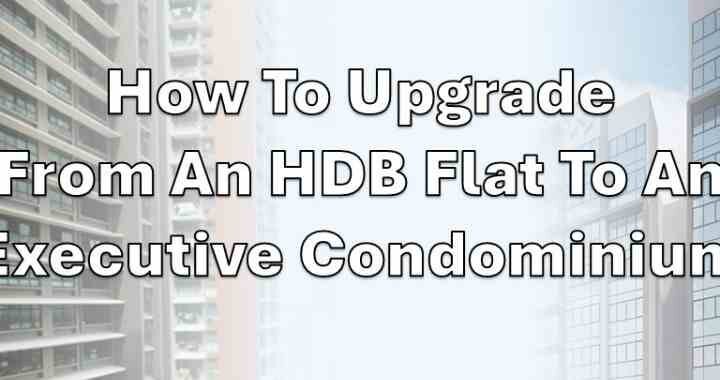- Executive Condo Eligibility
- Executive Condo Ownership Restrictions
- Minimum Occupation Period (MOP) and Rental Regulations
- Special Executive Condo Eligibility Cases
- EC Eligibility Criteria for Singapore Permanent Residents
- EC Eligibility Criteria for Single Singaporeans
- Executive Condo Financing
- The Pros and Cons of Owning an Executive Condo
- Conclusion: Executive Condo Eligibility Offers a Compelling Investment Opportunity?
- Other Property Guides
Before applying for a new EC, knowing the various executive condo eligibility criteria is important.
This article will explain who can buy a new executive condo and the HDB regulations governing its ownership. These include citizenship, household income, age, composition of applicants, and sale restrictions, amongst many others.
An executive condominium (EC) is a unique housing option in Singapore that bridges the gap between public housing and private condos and is governed by the Housing and Development Board (HDB).
Developed by private developers but subject to certain HDB terms and conditions, ECs offer features and amenities similar to private condos but at more affordable prices as the land is subsidised. This is to cater to the “sandwiched class” whose monthly household incomes exceed the limit eligible to purchase a BTO flat (capped at $14,000), but not exceeding $16,000, which may price them out of buying a private condo.
When buying an executive condo, understanding the eligibility requirements is crucial to prevent potential buyer’s remorse and future complications. But firstly, let’s check out the basic eligibility criteria and then the additional criteria for the following segments of buyers:
Executive Condo Eligibility
The basic executive condo eligibility criteria for owning a new EC in Singapore are as follows:
Citizenship: The main applicant must be a Singapore citizen (SC). At least one other member of the family nucleus in the application must be a Singapore citizen or Singapore permanent resident (SPR).
Family Nucleus: Applicants must apply as a family nucleus under one of the following schemes:
- Public Scheme: The applicant, their spouse, and children (if any); their parents and siblings (if any); or children under their legal custody, care, and control (if widowed or divorced). If an unmarried/ widowed/ divorced Singapore Citizen (SC) buys an executive condo with their parents, at least 1 of the parents must be an SC or Singapore permanent resident (SPR).
- Fiancé/Fiancée Scheme: The applicant must be a SC while the fiancé/fiancée can either be a SC or SPR. Under this scheme, a solemnisation of marriage and submission of a copy of the marriage certificate to the developer within 3 months of collecting the keys to the executive condo unit is required.
- Orphans Scheme: The applicant and their single (unmarried, divorced, or widowed) siblings who are orphans.
- Joint Singles Scheme: A single is ineligible to apply for an executive condo. However, the applicant and up to 3 other single (unmarried, divorced, or widowed) Singapore citizens can jointly apply, all of whom must be at least 35. (Note: Applicants in the Joint Singles Scheme are not eligible for CPF Housing Grant).
Age Requirements: the minimum age of all applicants must be at least 21 years old at the time of applying for an executive condo. But for those buying under the Joint Singles Scheme, all the applicants must be at least 35 years old.
Income Ceiling: The applicants’ gross monthly household income must not exceed S$16,000.
More information can also be found in our Executive Condo FAQs and HDB website.
Executive Condo Ownership Restrictions
No Existing Property Ownership: The applicant, their spouse, and any other occupiers listed in the application must not own or have disposed of any private residential property (locally or overseas) within the last 30 months.
These include properties acquired by gift or inheritance.
Previous Housing Subsidies: Applicants are not eligible to purchase a new executive condo if they have bought the following properties more than once:
- Resale HDB flat with CPF Housing Grant
- New HDB flat directly from HDB
- DBSS flat from a developer
- executive condo from a developer
Minimum Occupation Period (MOP) and Rental Regulations
Minimum Occupation Period: After taking possession of the executive condo unit, owners must live in the property for a minimum occupation period (MOP) of 5 years before selling it to Singaporeans and Singapore permanent residents. Only after the 10-year MOP are they eligible to sell to anyone, including foreigners.
Rental Restrictions: During the MOP, owners cannot rent out their entire executive condo unit but can rent out rooms. However, HDB must be informed of the rental within 7 days. HDB must also be notified of any rental renewal, termination, or tenant change.
Special Executive Condo Eligibility Cases
Undischarged Bankrupts: Prior consent must be obtained from the Official Assignee (OA) or the private trustee to purchase an executive condo unit. However, occupiers who are bankrupt do not need prior consent.
Dual-Key Executive Condo Units: For dual-key executive condo units, the family nucleus must include a multi-generation family, such as a married/engaged couple and their parents or grandparents, or a widowed/divorced person with children and their parents or grandparents.
Special Consent for Applicants below 21 Years Old: Written parental consent is needed if the spouse-to-be is 18 years old and above, but below 21. The person can only be listed as an essential occupier in the executive condo application. In addition, a Special Marriage Licence from the Ministry of Social and Family Development must be submitted.
EC Eligibility Criteria for Singapore Permanent Residents
Singapore Permanent Residents (PRs) are eligible to purchase executive condos, provided they meet the following additional criteria:
Citizenship Requirement: At least one other member of the family nucleus in the application must be a Singapore citizen. An SPR household is not allowed to purchase a new executive condo.
Income Ceiling: The applicants’ gross monthly household income must not exceed S$16,000.
Property Ownership Restrictions: The property ownership restrictions for Singapore Permanent Residents are the same as those of other eligible applicants.
EC Eligibility Criteria for Single Singaporeans
Under the executive condo eligibility regulations, single Singaporeans are only eligible to purchase an EC under the Joint Singles Scheme where the applicant and up to 3 other single co-applicants (unmarried, divorced, or widowed) can jointly buy an EC unit. However, they must meet the following additional criteria:
Minimum Age: All applicants must be at least 35 years old.
Citizenship: All applicants must be Singaporeans.
Income Ceiling: The applicants’ gross monthly household income must not exceed S$16,000.
Property Ownership Restrictions: The property ownership restrictions for single Singaporeans are the same as those of other eligible applicants.
Executive Condo Financing
When purchasing a new executive condo, there are two main financing options: Normal Progressive Payment Scheme (NPS) and Deferred Payment Scheme (DPS).
Under the Normal Progressive Payment Scheme, buyers make instalment payments according to the progress of the executive condo construction. The bank will disburse the first loan upon completion of the foundation work, and buyers will start their monthly housing loan repayments based on the amount disbursed (Refer to table below):
| Stages of Payments | Timeline | Normal Progressive Payment Scheme (NPS) | Deferred Payment Scheme (DPS) |
| Booking: Upon the grant of the Option to Purchase | Option Date | 5% (Cash) | 5% (Cash) |
| S&P: Upon the signing of the Sales & Purchase Agreement | 9 Weeks from Option Date | 15% (CPF or Cash) | 15% (CPF or Cash) |
| Foundation: Completion of Foundation Work | 6-9 Months | 10% (5% CPF or Cash and 5% Bank Loan) | – |
| Framework: Completion of Reinforced Concrete Framework | 6-9 Months | 10% (Bank Loan) | – |
| Wall: Completion of Brik Walls | 3-6 Months | 5% (Bank Loan) | – |
| Ceiling: Completion of Roofing/Ceiling | 3-6 Months | 5% (Bank Loan) | – |
| Windows: Completion of Electrical Wiring, Internal Plastering, Plumbing and Window Frames | 3-6 Months | 5% (Bank Loan) | – |
| Car Park: Completion of Car Park, Roads and Drains serving the housing development | 3-6 Months | 5% (Bank Loan) | – |
| TOP: Temporary Occupation Period | TOP | 25% (Bank Loan) | 65% (Bank Loan) |
| CSC: Certificate of Legal Completion | CSC | 15% (Bank Loan) | 15% (Bank Loan) |
In contrast, the Deferred Payment Scheme (DPS) allows buyers to make an initial downpayment of 20%, with 5% in cash and the remaining 15% using either cash or CPF. The balance of 80% is then financed through a bank loan. This scheme provides more flexibility for new executive condo buyers as the bulk of the loan will only take effect when the development reaches TOP.
Prospective buyers must understand the requirements and financing options available to assess affordability and eligibility before committing.
The Pros and Cons of Owning an Executive Condo
Executive Condos (ECs) are a unique housing option in Singapore, combining affordability with private condo features. However, they come with eligibility requirements and restrictions. Let’s weigh the pros and cons to on whether buying a new EC is your ideal choice.
The Pros of Buying an Executive Condo
Affordability: Executive condos are priced lower than private condominiums, making them more accessible to middle-income households, popularly known as the “sandwiched class”.
CPF Housing Grants: Executive condo applicants can receive up to $30,000 in CPF Housing Grants from the government depending on their monthly household income, which can be used to offset the purchase price of the property. An SC/SPR household may be eligible for a Citizen Top-Up of $10,000 when the SPR become an SC or they have an SC child. Refer to the table below on the amount of CPF housing grants given:
| Average Monthly Gross Income of Applicants/Occupants | FAMILY GRANT | Half Housing Grant
First-Timer (FT) SC & Second-Timer (ST) Who Has Previously Taken 1 Housing Subsidy |
|
| SC Household | SC/SPR Household | ||
| $10,000 or lower | $30,000 | $20,000 | $15,000 |
| $10,001 to $11,000 | $20,000 | $10,000 | $10,000 |
| $11,001 to $12,000 | $10,000 | Nil | $5,000 |
| $12,001 to $16,000 | Nil | Nil | Nil |
| *SC – Singapore Citizen *SPR – Singapore Permanent Resident | |||
Condominium-like Amenities: Executive condos offer facilities and amenities similar to those found in mass-market private condominiums, such as swimming pools, gyms, playgrounds, and landscaped gardens.
Potential for Capital Appreciation: Executive condos provide promising potential for capital appreciation over time given Singapore’s well-managed property market. Please refer to our EC case studies.
Financing for Resale Executive Condos: Financing for resale ECs is subjected to the Total Debt Servicing Ratio (TDSR) of 55% instead of the Mortgage Servicing Ratio (MSR) of 30% when they are purchased directly from developers (more details can be found in choosing a home loan. Hence, when you resell your executive condo, the higher financing limit will help boost the number of prospective buyers, which may increase the resale value of your executive condo in the process.
Deferred Payment Scheme (DPS): New executive condo buyers can opt for this scheme which only requires them to put down a 20% downpayment while deferring the rest of the payments after the property receives its Temporary Occupation Period (TOP). New EC buyers with existing mortgages who opt for DPS can benefit from the flexibility of managing their finances as no loan repayment is required until the TOP is issued. [Note: Under DPS, the property prices are usually marked 2-3% higher when compared to the Normal Progressive Payment Scheme. This is to “compensate” for interest losses that developers will incur].
Enjoy the Same Status as Private Condos: Upon fulfilling the Minimum Occupation Period (MOP) of 10 years, executive condos will achieve full private ownership status. This means they are no longer subject to restrictions on resale, allowing them to be freely sold to any eligible buyers, including foreigners.
The Cons of Buying an Executive Condo
Strict Eligibility Criteria: There are strict eligibility criteria to purchase an executive condo, including income ceilings and family nucleus requirements, which will exclude certain segments of buyers.
Financing Restrictions: Unlike HDB flats, executive condos can only be financed with bank loans, not with an HDB concessionary loan, which offers a lower interest rate.
Loan-to-Value (LTV) limit: A bank loan is capped at a Loan-to-Value (LTV) limit of 75%. For the remaining 25% downpayment for ECs, a minimum of 5% must be in hard cash while the balance can be in cash or CPF funds.
Mortgage Financing: Financing for new executive condos is subjected to the Mortgage Servicing Ratio (MSR), which caps the loan repayment to 30% of the applicant’s gross monthly income, as compared to the Total Debt Servicing Ratio (TDSR) of 55% applicable for the financing of private residential properties. This will limit the affordability of ECs.
Minimum Occupation Period (MOP): During the 5-year MOP, owners are restricted from reselling or renting out their executive condo unit. They can only rent out rooms.
Resale Levy for Second-Timers: Second-timer applicants who have previously bought a subsidised flat have to pay a resale levy when purchasing an executive condo. Please refer to the table below:
| First Subsidised Housing Type | Resale Levy Amount | |
| First Subsidised Housing Type | Recipient of CPF Housing Grant (Singles) | |
| 2-room/ 2-room Flexi flat | $15,000 | $7,500 |
| 3-room flat | $30,000 | $15,000 |
| 4-room flat | $40,000 | $20,000 |
| 5-room flat | $45,000 | $22,500 |
| Executive flat | $50,000 | $25,000 |
| Executive Condominium | $55,000 | Not applicable |
Location of Excutive Condos: All ECs are offered in the suburbs due to the lower land cost, which ensures their overall affordability. However, this may make them less accessible when compared to properties in more urban or city areas.
Conclusion: Executive Condo Eligibility Offers a Compelling Investment Opportunity?
Applying for a new executive condo presents a compelling opportunity for eligible buyers as it is a privilege primarily reserved for Singapore citizens. However, they must thoroughly understand the various executive condo eligibility criteria such as ownership requirements and financing options.
In addition, they must evaluate the investment potential of the executive condo they are interested in.
For example, the location of the executive condo is a crucial consideration, as proximity to amenities, schools, public transportation, workplace, and other desirable features can significantly impact the property’s value, liveability, and investment potential.
Prospective buyers should research the surrounding area and assess whether the executive condo offers a convenient and good standard of living, as well as the potential transformation under the URA master plan.
Although executive condos have been shown to offer attractive opportunities for capital appreciation and rental income, buyers must be mindful of any financing restrictions, such as the minimum occupation period, which can affect their ability to sell or rent the property in the short term.
Therefore, securing a new executive condo necessitates a deep market understanding, careful financial assessment, and a strategic approach to optimize investment benefits.
Seek Professional Guidance
Due to the myriad of executive condo eligibility criteria, the intricacies involved in the EC application and purchase process, as well as considerable financial commitment, it is highly recommended that prospective buyers seek the guidance of an experienced property agent.
In addition, the property agent can provide you with the latest developments related to Singapore’s property market and offer advice on the investment potential of various properties.
This can help to prevent buyer’s remorse, which can be due to the following factors:
- Financial Strain: Overextended buyers struggle to manage mortgage payments alongside other financial commitments. Job losses can exacerbate this stress.
- Emotional Purchases: Decisions driven by aesthetics or pressure to buy can lead to regret later when rational considerations are not properly evaluated.
- Life Changes: Changes in personal circumstances, such as a relationship breakup or divorce, can significantly impact the buyer’s ability to own the property.
- Sales Restrictions: Unforeseen events may prevent buyers from monetising their ECs due to the 5-year Minimum Occupation Period (MOP) restriction, causing frustration.
- Market Fluctuations: Real estate markets are cyclical, and buyers may regret committing to their properties at the wrong time, leading to adverse financial implications.
- Location Mismatch: Inadequate research or unforeseen changes in the neighbourhood can lead to dissatisfaction with the executive condo’s location or amenities.
If you require any information about post-launched executive condos such as Lumina Grand, Altura, or North Gaia, Novo Place, or if you wish to be updated on upcoming EC launches such as Aurelle of Tampines, please WhatsApp me.
Other Property Guides
If you are ineligible to purchase a new executive condo or prefer to invest in a private property, please refer to our review of new property launches. Meanwhile, below are some useful guides:
- How to buy a BTO flat
- How to buy an HDB resale flat
- New HDB Resale Flat Listing Service
- New HDB Flat Classifications
- How to Upgrade from an HDB Flat to an Executive Condo
- How to buy a new launch property
- How to buy a resale private property
- Understanding the En-Bloc or Collective Sale Process
Find out about the executive condo eligibility criteria and unlock the investment potential of this hybrid property type specially reserved for Singapore citizens.




